 |
 |
||||||
 |
|||||||
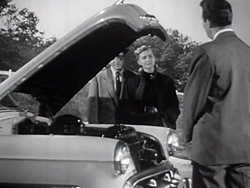
Horse sense is the thing a horse has which keeps it from betting on people. ~W.C. Fields
Gratuitous Art Productions/Films is a collaborative video art project between Jeff Burns and Cat Gilbert. We at Gratuitous seeks out the connections and inflections between today’s audience and yesterday’s bully pulpit. Gratuitous techniques have been keystones in both propaganda and filmmaking in the 20th century and over time, connotations-symbolic, political or otherwise allow us to manipulate sound and images to gratuitously inflict our own narratives.
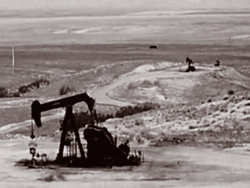
Gendered. Capitalistic. Power-mongering. Damaging. The oil industry hasn\'t changed since its inception. This re-editing of ephemeral films subtly highlights issues in the oil industry that are quite recognizable today, from male leadership in the industry to the damage of natural lands. Although amusing, this video serves as a reminder that the history of the oil industry is one that repeats itself, getting stuck in an endless loop of cultural and political folly.
Julie Casper Roth is an award-winning filmmaker and video artist whose work has been shown internationally. She is a 2008 New York Foundation for the Arts Fellow in Video and was thrilled to screen at Video Dumbo in 2008. Her work has been screened at the Scope Art Fair in NYC and Basel, the Athens Int\'l Film and Video Festival, MadCat Film Festival, Reeling GLBT Film Festival, the Southwest GLBT Festival, the SPEMA Technocracy Conference at Carnegie Mellon, Artist Television Access (San Francisco), the Elizabeth Foundation for the Arts (with NYFA), and other venues. Roth is an honors graduate of Smith College and currently resides in Upstate New York. www.juliecasperroth.com
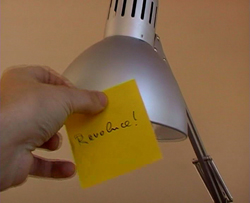
The film is founded on the confrontation between the Communist Manifesto and the utopian ideas of functionalist architect Karel Honzík. Based upon the film footage of socialist Czechoslovakia a question is posited here regarding the further development of post-communist countries. The Communist Manifesto and the concepts of Karel Honzík, who in the early '60s developed in his literary work the idea of a perfect communist society as the inevitable goal of cosmic matter, serve as a reflective bridge for considerations directed towards liberal capitalist societies.
Zbynek Baladrán (born 1973 in Prague) is an author, visual artist and curator. He studied art history at the Charles University in Prague from 1992-1996, and from 1997-2003 at the Prague Academy of Fine Arts. He is one of the co-founders and a curator of tranzitdisplay galler in Prague. He is also the co-curator, with Vít Havranek, of the project and exhibitions Monument to Transformation, a 3-year research project on social transformation. Baladrán is also a part of the team of curators (Alexandria Contemporary Arts Forum, Chamber of Public Secrets, and tranzit.org) for Manifesta 8, which will be held in Murcia, Spain in 2010.
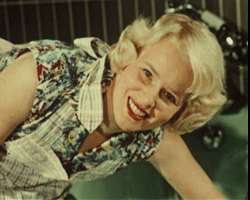
You are never satisfied with somthing you already have, and in striving for perfection you miss it. A movie with pictures from the building society „Neue Heimat “. It tells about tracking a dream of perfection, which becomes utopia.
Estela Estupinya García was born in 1983 in Castellón de la Plana, Spain. She studied Arts at the University in Valencia where she majored in video art. While she was studying at the Hochschule Für Bildende Künste of Hamburg she completed an Erasmus and a Freemove. This was where she first began to study cinema. She continued her education to attain a Masters in Cinematography at the HFBK.
‘Utopia’ is her first movie and she is currently working on her second one ‘El Tiempo de Clara’.
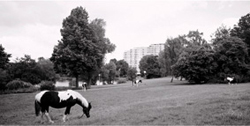
The city of Wolfsburg can be interpreted as a model of various urban planning and architectural blueprints of modernity. The film fluctuates between cinematic movement and photographic stagnation, thereby counteracting the metropolitan directive regarding mobility and acceleration.
Born in 1971 in Hamburg, Germany, Arne Bunk is an artist, a photographer, and a movie-maker. Graduated at the Fine Arts School of Hamburg, he currently works at a artistic/scientific thesis, “L’exploration et l’inspection filmiques des lieux” (filmic exploration and review of places).
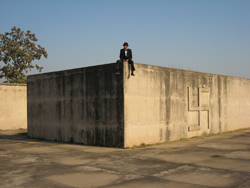
Meessen’s work is set in Chandigarh, the paragon of the modernist city planned by Le Corbusier in the 1950ies as a symbol of the new, progressive nation of India who had just emerged from its colonial past. Due to its strategic situation – close to the frontier with Pakistan and on the border between two Indian states, Punjab and the subsequently created state of Haryana - Chandigarh houses common institutions for both linguistic communities. The city’s architectural structure is that of a grid pattern, at the very centre of which the ‘Capitol’ rises: a phantasm of centralised political power, overlooking the unfinished city. Haunted by the ghosts of modernism, it leaves plenty of room for silhouettes, voices and sounds weaving together a fable cherished by the late architect about the Raven that wants to imitate the Eagle. 'Dear Adviser' is a poetic address to Le Corbusier and the in Chandigarh superstitiously as “advisor” disguised legislator.
The work of Vincent Meessen connects forms of the documentary with performance and fictional elements. It reveals the artist’s interest in strategies of translation and forms of hybridization: from the crossfading of different locations and times, to formal short-circuiting of language and image, to conscious commixture of history and phantasm, of the political and the poetical. Subverting conventional filmic styles, his "experiential documents" (Meessen) draw our attention to the shifting territories, contested spaces, and informal architectures characteristic of the postcolonial situation. Despite their complex formal structure, all of Meessen's videos transmit a sense of openness, resulting from their performative qualities. (extract from a text by Katrin Mundt for Argos, 2008)
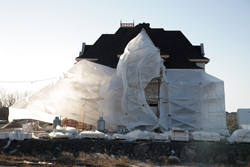
'Losing Ground' is a critique of urban sprawl and the resulting erosion and homogenization of the countryside across the world. With its negation of city history, of geographic particularities, and thus of cultural memory, this standardized urbanization imposes its amnesia, individualistic lifestyle, and jarring presence in nature. Filmed in Quartier DIX30 in Brossard, the biggest lifestyle center in Canada, the video sounds out recently man-made territories so as to decipher humanity’s relationships with the environment. It confronts us with the dizzying spectacle of our diminishing local references, as they give way to cultural stereotypes, now become universal through globalization.
Born in 1969, Isabelle Hayeur lives and works in Montreal. As an image-making artist, she is known for her large digital montages, her videos and her site-specific installations. An ecological, social and urban planning critique provides the framework for her artistic practice. Having lived in a suburb for some twenty years, she has been confronted with the sad spectacle of urban sprawl and all that it consigns to oblivion. Her approach is tied to this experience and draws from discourses about environmental issues and land use planning. She is particularly interested in the feelings of alienation, uprooting and dislocation. Her artworks have been shown in the context of numerous exhibitions and festivals.